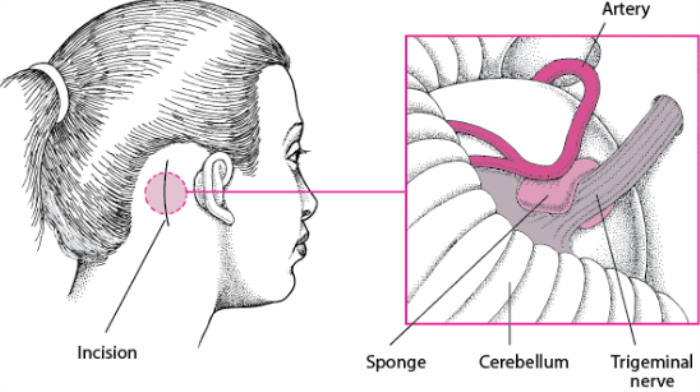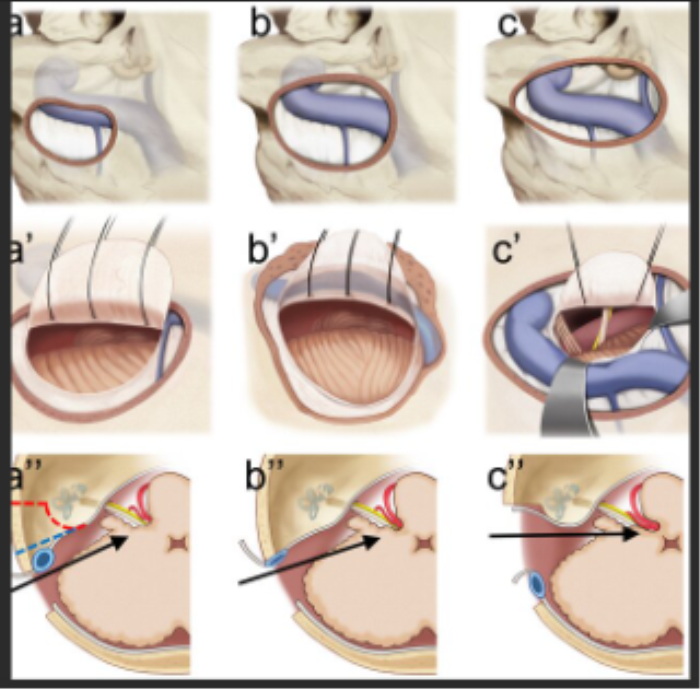Microvascular Decompression (MVD) surgery in India offers advanced treatments for conditions like trigeminal neuralgia, hemifacial spasm, and glossopharyngeal neuralgia. With top hospitals and experienced neurosurgeons, India provides world-class care and cost-effective solutions for both domestic and international patients seeking effective MVD surgery.
Medical disclaimer: This content is for general awareness and does not replace a doctor’s consultation. For diagnosis or treatment decisions, consult a qualified specialist.
Understanding Microvascular Decompression (MVD) Surgery
What is Microvascular Decompression (MVD) Surgery and How Does it Work?
Microvascular Decompression (MVD) is a specialized neurosurgical procedure aimed at relieving pressure on cranial nerves caused by blood vessels. This surgery is commonly used to treat conditions such as trigeminal neuralgia, where nerve compression leads to severe facial pain.
During MVD surgery, a small incision is made behind the ear, and the neurosurgeon carefully moves the offending blood vessel away from the nerve, placing a small pad between them to prevent further contact. This procedure requires high precision and is performed under a microscope to ensure accuracy and safety.

When is Microvascular Decompression (MVD) Surgery Necessary?
MVD surgery is typically necessary when patients experience severe, debilitating pain from conditions like trigeminal neuralgia that do not respond to medication. It is also recommended for patients with hemifacial spasm or glossopharyngeal neuralgia when conservative treatments are ineffective.
Different Conditions Treated by Microvascular Decompression (MVD) Surgery
MVD surgery is primarily used to treat trigeminal neuralgia, but it is also effective for hemifacial spasm and glossopharyngeal neuralgia. Each condition involves compression of cranial nerves by blood vessels, and MVD offers a potential cure by relieving this pressure, providing long-term relief from symptoms.
The Microvascular Decompression (MVD) Surgery Procedure
Pre-Surgery Evaluation Process
The pre-surgery evaluation process for MVD surgery involves a comprehensive assessment, including detailed medical history, neurological examination, and imaging studies like MRI or CT scans. This evaluation helps confirm the diagnosis and ensures that MVD is the most appropriate treatment option.
Choosing the Right Type of Treatment for Cranial Nerve Compression
Choosing the right treatment for cranial nerve compression depends on the specific condition, severity of symptoms, and patient health. MVD surgery is often recommended for its high success rate and long-term relief, especially when other treatments have failed.
Detailed Surgical Procedure for Microvascular Decompression (MVD)
The detailed surgical procedure for MVD involves general anesthesia, followed by making an incision behind the ear to access the cranial nerves. The neurosurgeon uses microsurgical techniques to reposition the blood vessel causing nerve compression and places a small pad to prevent recurrence. The surgery is completed with closing the incision and post-operative monitoring.

Post-Surgery Care and Recovery
Post-surgery care for MVD surgery includes pain management, monitoring for any complications, and a gradual return to normal activities. Most patients experience immediate relief from symptoms, with recovery involving rest and follow-up appointments to ensure proper healing and nerve function.
Top Hospitals for Microvascular Decompression (MVD) Surgery in India
Leading Hospitals for Microvascular Decompression (MVD) Surg AIIMS Delhi, Apollo Hospitals Chennai, Fortis Memorial Research Institute Gurgaon, and Narayana Health Bengaluru. These institutions are known for their specialized neurosurgery departments and experienced surgeons who are experts in performing MVD.
Best Microvascular Decompression (MVD) Surgery Doctors in India
India is home to some of the finest MVD specialists, including Dr. Sandeep Vaishya, Dr. Bipin Walia, and Dr. Sudhir Dubey, who are recognized for their expertise in treating trigeminal neuralgia and hemifacial spasm. These top neurosurgeons practice at leading hospitals such as Fortis Hospital, Max Super Speciality Hospital, and Medanta, offering advanced MVD procedures and comprehensive patient care.
Success Rates and Survival Statistics for Microvascular Decompression (MVD) Surgery in India
Success rates for MVD surgery in India are high, with many hospitals reporting success rates of 85% to 95% in alleviating symptoms like trigeminal neuralgia. Survival statistics are favorable, with most patients experiencing long-term relief and a significant improvement in quality of life.
Legal and Ethical Considerations for Microvascular Decompression (MVD) Surgery in India
Legal and ethical considerations for MVD surgery in India include ensuring informed consent, maintaining patient confidentiality, and adhering to national and international medical standards. Hospitals are committed to ethical practices, providing transparent information about the risks, benefits, and costs of MVD surgery.
Cost of Microvascular Decompression (MVD) Surgery in India
The cost of MVD surgery in India typically ranges from ₹3,00,000 to ₹7,00,000, depending on the hospital, surgeon’s expertise, and the complexity of the case. Despite the affordability, patients receive high-quality care, making India a preferred destination for MVD surgery.
Explore a detailed breakdown of microvascular decompression (mvd) surgery cost in India by visiting our in-depth guide microvascular decompression (mvd) surgery cost in India.
Preparing for Microvascular Decompression (MVD) Surgery
Lifestyle Changes Before Microvascular Decompression (MVD) Surgery
Before MVD surgery, patients are advised to make lifestyle changes such as maintaining a healthy diet, avoiding smoking, and managing stress to enhance overall health. These changes can improve surgical outcomes and support a smoother recovery process.
Medications and Treatments Required for Microvascular Decompression (MVD) Surgery Patients
Patients undergoing MVD surgery may require pre-operative medications to manage pain and inflammation. Post-surgery, medications might include pain relievers, anti-seizure drugs, and antibiotics to prevent infection and manage recovery effectively.
Importance of Support Systems and Counseling for Microvascular Decompression (MVD) Surgery Patients
Support systems and counseling are crucial for patients undergoing MVD surgery, providing emotional support and helping manage anxiety related to the surgery. Access to counseling and a strong support network can greatly improve the patient’s overall experience and recovery outcomes.
Life After Microvascular Decompression (MVD) Surgery
Recovery Process After Microvascular Decompression (MVD) Surgery
The recovery process after MVD surgery involves a combination of rest, pain management, and gradual resumption of daily activities. Patients are encouraged to follow their surgeon’s advice, attend regular follow-up appointments, and engage in physical therapy if needed to ensure full recovery.
Long-term Care and Monitoring After Microvascular Decompression (MVD) Surgery
Long-term care and monitoring after MVD surgery include regular check-ups to assess nerve function and monitor for any recurrence of symptoms. Patients should continue to follow a healthy lifestyle and consult their doctor if any new symptoms arise.
Potential Risks and Complications of Microvascular Decompression (MVD) Surgery
Potential risks and complications of MVD surgery include infection, bleeding, hearing loss, and facial weakness. However, with skilled surgeons and proper post-operative care, these risks are minimized, and the majority of patients experience significant relief from their symptoms.
Latest Advancements in Microvascular Decompression (MVD) Surgery
Minimally Invasive Techniques in Microvascular Decompression (MVD) Surgery
Minimally invasive techniques in MVD surgery have evolved to use smaller incisions, advanced imaging, and precision instruments, reducing tissue damage and speeding up recovery. These advancements have made MVD surgery safer and more effective, with shorter hospital stays and faster return to normal activities.
Use of Robotics and Navigation Systems
The use of robotics and navigation systems in MVD surgery enhances precision, allowing surgeons to perform complex procedures with greater accuracy. These technologies provide real-time guidance, improving surgical outcomes and reducing the risk of complications.
Development of Advanced Surgical Instruments
The development of advanced surgical instruments for MVD surgery focuses on improving precision, reducing invasiveness, and enhancing patient safety. Innovations such as high-definition microscopes and specialized micro-instruments have significantly improved the success rates of MVD surgeries.
Frequently Asked Questions (FAQs) about Microvascular Decompression (MVD) Surgery
What is the success rate of Microvascular Decompression (MVD) surgeries in India?
Success rates for MVD surgeries in India are generally high, with many hospitals reporting success rates between 85% and 95% for relieving symptoms of conditions like trigeminal neuralgia. The outcomes are highly favorable, with most patients experiencing significant, long-lasting relief.
How long is the hospital stay after Microvascular Decompression (MVD) surgery?
The hospital stay after MVD surgery typically ranges from 2 to 5 days, depending on the patient's recovery progress and the complexity of the procedure. Some cases may require a longer stay to ensure optimal recovery.
What is the cost of Microvascular Decompression (MVD) surgery in India?
The cost of MVD surgery in India varies between ₹3 lakh and ₹7 lakh, depending on the hospital, surgeon’s expertise, and other factors. India’s competitive pricing combined with high-quality care makes it a preferred choice for MVD surgery.
What are the eligibility criteria for Microvascular Decompression (MVD) surgery?
Eligibility for MVD surgery depends on the specific cranial nerve condition being treated, the severity of symptoms, and the patient's overall health. A thorough evaluation by a neurosurgeon is required to determine if MVD is the appropriate treatment option.
What is the recovery time after Microvascular Decompression (MVD) surgery?
Recovery time after MVD surgery generally ranges from 4 to 8 weeks, depending on individual patient factors and the complexity of the surgery. Following the surgeon’s post-operative care instructions is crucial for a smooth recovery.
What are the risks and complications associated with Microvascular Decompression (MVD) surgeries?
Potential risks and complications of MVD surgery include infection, bleeding, hearing loss, and facial nerve damage. However, these risks are minimized with proper surgical techniques and post-operative care.
How do I find a suitable hospital for Microvascular Decompression (MVD) surgery in India?
To find a suitable hospital for MVD surgery in India, consult with your doctor and research hospitals with specialized neurosurgery departments. Consider factors such as hospital reputation, surgeon experience, and patient reviews to make an informed decision.
What kind of post-surgery care is required after Microvascular Decompression (MVD) surgery?
Post-surgery care after MVD surgery involves medication for pain management, regular follow-up appointments to monitor recovery, and possibly physical therapy to aid in rehabilitation. Adhering to the care plan provided by the healthcare team is essential for optimal recovery.
Are Microvascular Decompression (MVD) surgeries covered by insurance in India?
Some insurance plans in India do cover MVD surgeries, but coverage can vary based on the policy. It is advisable to check with your insurance provider for details regarding coverage and any potential out-of-pocket expenses.
Where can I find support groups for Microvascular Decompression (MVD) surgery patients in India?
Support groups for MVD surgery patients in India can be found through hospitals, rehabilitation centers, and online communities. These groups offer valuable emotional support and information during the recovery process.
Discover the Best Neurosurgery Hospitals and Neurosurgeons in India
When it comes to brain and spine care, choosing the right hospital and specialist is essential. We�ve highlighted the top neurosurgery hospitals and neurosurgeons across India to ensure you receive the best care available.
Top Neurosurgery Hospitals in India
Find the leading centers for brain and spine care:
Best Neurosurgeons in India
Meet the top specialists in brain and spine surgery:
Get more indepth information on Neurology treatments and their costs.
Conclusion
Your brain and spine health deserve the best care. Explore the links above to learn more about the top neurosurgery hospitals and neurosurgeons in India.